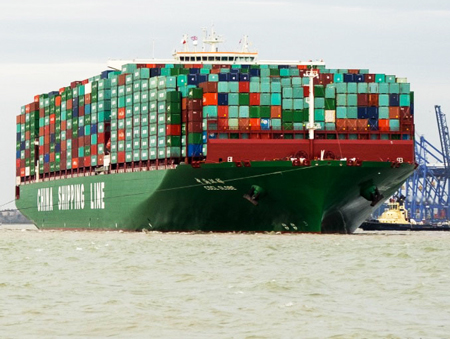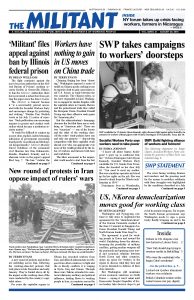Claiming Beijing has been “cheating,” Washington imposed a series of tariffs on Chinese goods, seeking to use its superior clout to gain concessions to aid U.S. bosses in trade between the two countries. The Chinese rulers, so far, have responded in kind. Washington is engaged in similar disputes with the capitalist rulers in Canada, Mexico and the protectionist trade bloc called the European Union. President Donald Trump says their offensive seeks gains for “American jobs.”

But the administration’s demagogy obscures the fact that there are no such thing as “American jobs.” There are two “Americas” — one of the bosses and the other of the working class. All the rulers’ trade policies have one and only one purpose — dog-eat-dog competition with their capitalist rivals abroad over who can appropriate ever more of the wealth produced by the labor of workers and farmers both here and worldwide.
The labor movement in the imperialist world needs to start from the fact that the working class is an international class, that’s our “we,” and not side with the U.S. rulers in their trade skirmishes. Our interests lie in opposing their use of protectionist barriers of any kind, regardless of where imported goods come from.
Addressing this question in 1848 in a “Speech on the Question of Free Trade,” Karl Marx, the founder of the modern revolutionary working-class movement, explained that whether the rulers’ policies are free trade or protectionist, either way the worker “goes to the wall.” The stronger the capitalists get, the better position they’re in to exploit our class.
In so far as it advances the development of capitalism and deepens struggles between the capitalists and the working class, Marx explained, free trade “hastens social revolution” and the working-class movement should favor it — on that basis alone.
Washington has sought for years to check the rising power of the Chinese capitalists. The massive growth of industry over the last three decades in the world’s most populous country has driven Chinese bosses to seek markets and new sources of labor to exploit around the globe, driving them into sharper competition with the U.S. rulers. And the U.S. capitalist class is determined to defend its position as the dominant imperialist power for as long as it can.
The Trump administration imposed $34 billion in tariffs on Chinese goods being sold in the U.S. July 6. It says it intends to reduce the U.S. rulers’ trade deficit with Beijing and press the Chinese government to end requirements that U.S. bosses investing in Chinese businesses share the technology they use with them. Beijing denies they enforce such requirements. It retaliated by imposing matching tariffs of $34 billion on goods U.S. bosses sell in China.
Washington announced Aug. 1 it would impose an additional 25 percent tariff on $200 billion worth of goods sold by Chinese companies in September, if Beijing doesn’t back down. While claiming they will prevail, the Chinese rulers know they face a challenge.
Although their economy has been growing faster, the Chinese rulers go into these trade conflicts with Washington far weaker than their U.S. counterparts. The U.S. bosses gross domestic product was $19.4 trillion in 2017, China’s total — though second highest in the world — was $12 trillion. Chinese bosses are more dependent on access to the vast U.S. market, than U.S. bosses are on access to Chinese markets.
Beijing has already offered to increase its purchase of goods manufactured in the U.S., but so far Washington says that isn’t enough.
Concessions from EU rulers
The announcement of the most recent U.S. tariff comes after the President Trump cut a deal with Jean-Claude Juncker, president of the Berlin-dominated EU trading bloc. Prior to meeting with Juncker, the U.S. government had imposed punishing tariffs on steel and aluminum exported by the bosses from Europe.
Trump got Juncker’s agreement that the rival capitalist governments making up the EU will work with Washington to challenge Beijing. Juncker also agreed that capitalist nations within the EU will import more U.S.-produced liquefied natural gas. This is aimed at undercutting Moscow’s exports of oil and gas to Germany, a matter Trump scolded German Chancellor Angela Merkel about last month. Juncker also agreed the EU would work with the U.S. government to eliminate tariffs on all non-auto-related industrial goods. If implemented, such a move would be most beneficial to the strongest capitalists powers — especially Washington.
The liberal press moguls have greeted the trade conflicts with catastrophic warnings about what they claim is a “trade war.” These claims are part of their hysterical efforts to paint Trump as dangerous who must be removed from office by any means necessary.
But real imperialist trade wars in history have often been a prelude to real shooting wars, as was the U.S. rulers’ decision to blockade all oil and steel exports to Japan in 1941.
There is no reason to think that Washington’s trade dispute with Beijing is aimed at provoking a trade war, much less World War III. Trump’s moves — like his administration’s other recent foreign policy steps — involve punishing sanctions or tariffs as a way to get talks on more favorable terms for the U.S. rulers.
However the trade dispute between the bosses in the U.S. and China ends, U.S. bosses won’t “reward” U.S. workers. Whether their victory leads them to pump up production for new trade, or if setbacks lead them to cut back, their profits depend on squeezing the workers.
AFL-CIO President Richard Trumka backs the administration’s tariffs, identifying workers needs with those of the bosses. But this course can only lead to disaster. Our problem isn’t workers abroad — it is capitalism. Our problem is the bosses and their government here in the U.S. We need to chart a course to overthrow the rule of the capitalist bosses who exploit us and take political power into our own hands.
The labor movement needs to start from the solidarity and common interests of workers in the U.S., China and around the world. We demand the unconditional lifting of all Washington’s tariffs and sanctions.

